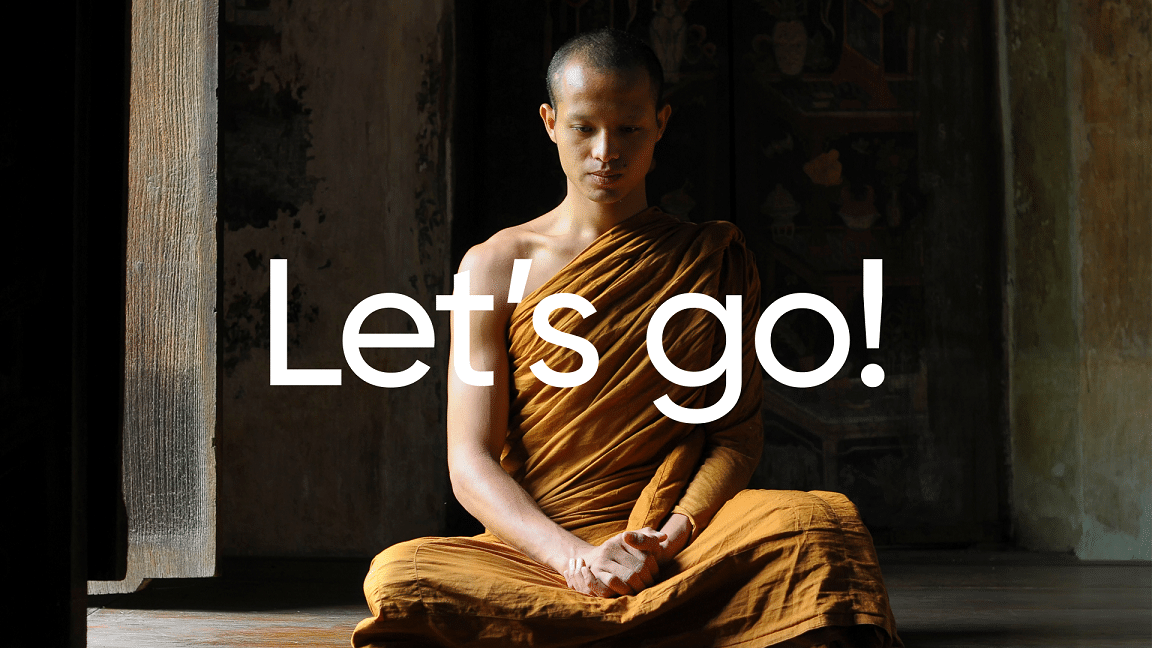Sometimes it can feel like there aren’t enough hours in the day to get everything done. Whether you are a stay-at-home mum, employed, self-employed, or starting your own business, there are days where the hours do not feel like enough for you to do all you need to and still sleep. If you have ever or are currently experiencing this, you might be tempted to wonder, can meditation replace sleep? After all, if a few minutes of mediating can save on hours of sleep, then you have saved time to do all that you need to do.
What Is Meditation?
Meditation is an ancient practice that has been traced to India as far back as several thousand years (approximately 1500) BCE (Before Common Era). During these times, and in the history that followed, the practice was used to help deepen the understanding of the sacred and mystical forces of life. However, as it has moved to the west and has been accepted in other countries, meditation is used for other purposes and benefits.
- Reducing stress
- Increasing self-awareness
- Reducing and controlling anxiety
- Increasing imagination and creativity
- Improving symptoms of depression
- Enhancing concentration and mental clarity
- Improving age-related memory loss through the use of mantras
- Increasing patience and tolerance towards yourself and those around you.
- May help fight addictions or destructive behaviors such as alcoholism and binge eating.
- May help sick people who are dealing with sleep problems, cancer, chronic pain, asthma, tension headaches, irritable bowel symptoms, and high blood pressure, among others.
As seen above, this practice can be helpful to those with sleep problems such as insomnia or sleep disturbances. However, can deep meditation replace a night’s sleep?
Read More: Meditation For Insomnia: Best Techniques To Ensure A Good Night’s Sleep
What Type Of Meditation Can Temporarily Replace Sleep?
If you have been wondering if meditation can replace sleep and if there is a specific type of meditation that can be used to do this, the truth is that there is no variation of this exercise that can replace several hours of missed sleep. You must rest every night for the appropriate amount of hours to get all the benefits of sleep.
However, if you are thinking about waking up 20 to 30 minutes earlier (thus cutting sleep short) to meditate, then this is fine. Meditation early in the morning can help you set your intentions for the day, and once you are done, you will feel more awake, and your mind will be sharper.
If you wish to reach into the deep crevices of your mind, take yourself out of the mental loop, regain balance, infuse yourself with optimism, and cultivate compassion – BetterMe: Meditation & Sleep app is exactly what you need!
How Much Sleep Can Meditation Replace?
If you are still insistent on trying to figure out if meditation can replace sleep, a limited study published in 2010 suspected the experienced yogis who slept less than 7 hours were replacing one to three hours of sleep with meditation, even with no evidence of sleep during the bouts of meditation (3). Researchers could not figure out how this was effectively done.
Since there isn’t enough information to support this claim, it would be best for you not to attempt it. Instead, try to find meditation techniques to help you sleep better.
Types Of Deep Sleep Meditation For A Good Night’s Rest
Meditation before bed is a great way to ensure that you get better sleep and rest as much as you need to before a new day.
Here are some techniques that you can use:
-
Breathing Exercises
Using breathing exercises as a form of meditation for sleep involves focusing on and regulating your breaths, then eventually slowing them down, thus signaling your mind that it is time to fall asleep. Here is how to do it:
- While in bed and lying comfortably, take a long, deep inhale, and notice how your body expands.
- Breathe out fully and focus on how your body feels as you do this.
- After doing this a few times, slow down as you exhale, making sure that the time spent exhaling is twice as long as the time taken on every inhale.
-
Body Scanning
Not only can this method help with better sleep, but it can also help relieve anxiety and stress, improve self-awareness and self-compassion, reduce pain (especially for those living with chronic pain), and reduce nicotine cravings (for those trying to quit smoking (2)).
Here is how to meditate to sleep using the body scan method:
- Lie down in a comfortable position and allow your limbs to fall and stretch easily.
- Close your eyes, and begin focusing on your breath. Notice the sensation of your body expanding as you breathe in and contracts as you breathe out.
- Choose where to begin. You may start at the very top of your head or from your legs. Most people opt to start at the bottom going up.
- Start at your toes and assess how they feel. After you have analyzed them, switch them off and go to your foot.
- Do this on both legs and go all the way up till you reach your head.
-
Visualization
Bedtime visualizations require you to replace your anxious, fearful thoughts with calming and restful images to help relax your mind, making it easier for you to fall asleep.
- Imagine yourself in a place where you once felt the most peaceful and relaxed. This could be while walking in an expansive field of flowers, sitting by the ocean watching and listening to the waves crashing on the beach, lying outside watching the stars and listening to crickets chirping, etc.
- Once your mind is here, notice as many sensory details as you can. What time of the day is it? Are you cold and chilly or warm and cozy? What sounds are there? If you are in an ocean, are the waves crashing? What does the sky look like? If you are watching the stars, how bright are they? Can you feel the grass under your feet? Is a campfire cracking nearby?
Visualize this peaceful place for a few minutes before going to bed or while in bed, and it will help you fall asleep faster.
Read More: Visualization Meditation: Benefits And Techniques To Help You Unlock The Life Of Your Dreams
-
Practicing Gratitude
This is the practice of being grateful for what we have. It is a feeling of happiness that comes from the appreciation of all that we have. Take a few moments to practice love and kindness in all aspects of your life. This will put you in a good mood and will help you fall asleep.
-
Counting
Counting down from any chosen number helps your mind slow down enough to let you fall asleep.
-
Practice Yoga
Using some yoga poses and focusing on your breathing while in these poses will help you wind down your day and relax. Some yoga asanas to help with night meditation for sleep include Child’s Pose, Standing Forward Bend, and Corpse pose, among others (6).
Should You Use Meditation To Try And Replace Sleep?
No, you should not. According to the Centers for Disease Control and Prevention, 1 in every 3 adults does not get enough sleep. Lack of sleep is caused by factors such as (1):
- Sleep Apnea – A potentially serious sleep disorder in which breathing repeatedly stops and starts.
- Your diet – Spicy foods, which may cause heartburn, and too much caffeine will keep you awake. Even having some alcohol before bed will interfere with how well you sleep.
- Lack of physical activity
- Mental issues – Such as depression, stress, and anxiety
- Restless leg syndrome – A condition that causes an uncontrollable urge to move your legs. It often happens in the evening or nighttime hours when you’re sitting or lying down.
- Bad Sleep habits
The Sleep Foundation recommends that young adults (18 to 25 years old) and adults aged 26 to 64 years old should aim to get 7 to 9 hours of sleep every night, while those above 64 years should sleep for at most 8 hours a night.
If you’ve dipped your toes in meditation before but couldn’t sit through a session because of all the thoughts buzzing in your head, impulses snatching away control or all the overwhelming feelings that start bubbling up the minute you sink into the silence, it’s only because you didn’t have the right guidance. Start using BetterMe: Meditation & Sleep app and watch your life transform!
What Are The Dangers Of Lack Of Sleep?
Although the thought of meditation replacing sleep is quite tempting, it is not advisable. Not only do some people not sleep enough as it is, but also lack of sleep make you miss out on benefits such as:
- A healthy heart that lowers the risk of cardiovascular disease and stroke.
- Prevention against breast and colon cancer.
- Lower risk of high blood pressure due to lower levels of stress.
- Reduced inflammation that prevents you from getting diseases such as diabetes, cancer, and heart disease.
- Improved memory and concentration.
- Increased immunity.
- Reduced risk of depression.
- Weight loss since the sleepy brain will always look for comfort food. Whenever you are sleep deprived, you are most likely to go looking for high carb foods that are full of sugar, which will derail your weight loss efforts. This phenomenon also increases your hunger hormone ghrelin while suppressing the satiety hormone, leptin.
- Increased sex drive and fertility.
Instead of trying to use meditation to replace sleep, use night meditation to help you snooze better so you can receive the benefits mentioned above.
What Are The Dangers Of Meditation?
While meditation has some incredible benefits, it also comes with several downsides that everyone who is looking to try this practice must be aware of and take caution against. In 2017, a study was conducted by Brown University in the US, involving 60 experienced practitioners of Buddhist meditation, in an effort to look into this matter.
Using interview questions and a followed up survey, the university tried to uncover the typically underreported effects of meditation that have been described as challenging, difficult, distressing, functionally impairing, and/or requiring additional support. The end of the study revealed that this practice may not be as harmless as people think it is (5).
Here are some dangers that were associated with meditation:
1. It May Promote Negative Thinking
It is no secret that meditation can help those with negative intrusive thoughts get rid of them. After all, this practice has helped people suffering from depression and anxiety deal with their symptoms. With that being said, we cannot always control our thoughts. In the 2017 study, almost half of the participants reported experiencing irrational thoughts due to meditation.
2. May Cause Paranoia/Delusions
As stated above, we cannot always control the direction that our minds take no matter how much we desire it. In the 2017 study, the study subjects reported feelings of paranoia or feeling delusional after meditating. A 2009 study by the Seattle Pacific University also showed that this practice has some mental health consequences to those who take part in it (4).
3. May Alter Your Sensory Perception
Sensory perception is your capability to process stimuli in your environment using your five senses, which are hearing, seeing, tasting, smelling, and touching. Anyone suffering from an altered or disturbed sensory perception experiences a change in the amount of patterning of incoming stimuli, accompanied by a diminished, exaggerated, distorted, or impaired response to such stimuli. Some of those who participated in the study reported seeing visions, hallucinations, illusions, or lights that weren’t there, while others were reported to have an increased sensitivity to light and noise and distortion in time and space.
4. Could Lead To Frustration
It should be noted that some people who start practicing meditation go into practice with the hope of seeing the above-mentioned visions. Transcendence meditation and third-eye meditation are popular forms used to try and achieve this. While some claim to see the said visions, not everyone will manage to do so in their lifetime. This leads to a lot of frustration in the matter.
5. Non-Attachment
In meditation, non-attachment is the habit of taking a step back from whatever happens or whatever we feel, acknowledging that it is transient and accepting that it will soon change and transform. While this habit works perfectly for this practice, it’s the opposite in actual life. If you use this same mantra in real life, you may end up avoiding work, repressing feelings or emotions, or disregarding your emotions and those around you, hence leading to losing jobs, friends, and relationships.
6. Buried Negative Emotions May Resurface
Most people in life will choose to bury and forget their negative, hurtful, and embarrassing experiences to move on with life, in hopes to feel happier. However, a big part of meditation is awareness, which means that you must interact with yourself and confront these experiences and the feelings that may come with it. This could trigger hard to handle feelings of anger, panic, fear, depression, jealousy, grief, or anxiety.
7. You May Lose Your Sense Of Self And Begin To Notice The Negative Qualities About Yourself
Participants in the 2017 study reported feeling a loss of agency, sense of basic self, and ownership. Moreover, they also claim to feel as though the boundaries between themselves and the rest of the world had begun to blur.
A 1992 study done by a professor at the University of California revealed that people returning from a meditation retreat reported being more aware of their negative qualities. While this could be a good thing to help you work on making yourself better, it may lead to depression or loss of self-worth.
DISCLAIMER:
This article is intended for general informational purposes only and does not address individual circumstances. It is not a substitute for professional advice or help and should not be relied on to make decisions of any kind. A licensed physician should be consulted for diagnosis and treatment of any medical conditions. Any action you take upon the information presented in this article is strictly at your own risk and responsibility!
SOURCES:
- 8 reasons why you’re not sleeping (2014, health.harvard.edu)
- Brief meditation training induces smoking reduction (2013, ncbi.nlm.nih.gov)
- Meditation acutely improves psychomotor vigilance, and may decrease sleep need (2010, ncbi.nlm.nih.gov)
- Mindfulness meditation research: issues of participant screening, safety procedures, and researcher training (2009, pubmed.ncbi.nlm.nih.gov)
- The varieties of contemplative experience: A mixed-methods study of meditation-related challenges in Western Buddhists (2017, journals.plos.org)
- Yoga for better sleep (2020, health.harvard.edu)


















